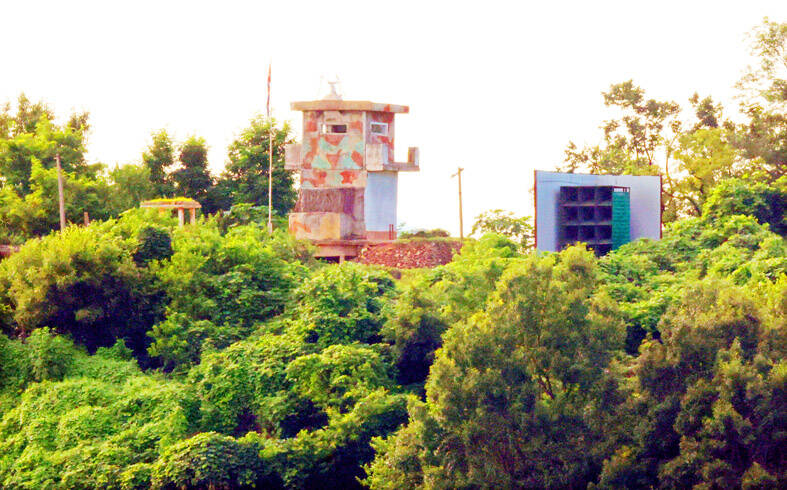South Korea fired warning shots at North Korean soldiers that briefly crossed the heavily fortified border earlier this week, Seoul said yesterday after Pyongyang accused it of risking “uncontrollable” tensions.
South Korean President Lee Jae-myung has sought warmer ties with the nuclear-armed North and vowed to build “military trust,” but Pyongyang has said it has no interest in improving relations with Seoul.
Seoul’s military said several North Korean soldiers crossed the border on Tuesday while working in the heavily mined demilitarized zone (DMZ) separating the two Koreas.

Photo: Yonhap via AP
The incursion prompted “our military to fire warning shots,” South Korea’s Joint Chiefs of Staff said in a statement, adding that “the North Korean soldiers then moved north” of the de facto border.
Pyongyang’s state media said earlier yesterday that the incident occurred as North Korean soldiers worked to permanently seal the frontier dividing the peninsula, citing a statement by Army Lieutenant General Ko Jong-chol.
Ko called the event a “premeditated and deliberate provocation,” saying that South Korea’s military used a machine gun to fire more than 10 warning shots toward the North’s troops, the Korean Central News Agency reported.
“This is a very serious prelude that would inevitably drive the situation in the southern border area where a huge number of forces are stationing in confrontation with each other to the uncontrollable phase,” Ko said.
The last border confrontation between the two Koreas was in early April, when South Korea’s military fired warning shots after about 10 North Korean soldiers briefly crossed the frontier.
North Korea’s military announced on October last year that it was moving to totally shut off the southern border, saying it had sent a message to US forces to “prevent any misjudgment and accidental conflict.”
Shortly after, it blew up sections of the unused, but deeply symbolic roads and railroad tracks that connect the North to the South.
Ko warned that the North Korean army would retaliate against any interference with its efforts to permanently seal the border.
“If the act of restraining or obstructing the project unrelated to the military character persists, our army will regard it as deliberate military provocation and take corresponding countermeasure,” he said.
Korea Institute for National Unification senior analyst Hong Min said that Pyongyang was again accusing Seoul of pursuing a “dual approach” with its latest outburst — calling for dialogue while in its view raising military tensions.
North Korean leader Kim Jong-un called earlier this week for the “rapid expansion” of the North’s nuclear weapons capability, citing ongoing US-South Korean military exercises which he claimed could “ignite a war.”

Shamans in Peru on Monday gathered for an annual New Year’s ritual where they made predictions for the year to come, including illness for US President Donald Trump and the downfall of Venezuelan President Nicolas Maduro. “The United States should prepare itself because Donald Trump will fall seriously ill,” Juan de Dios Garcia proclaimed as he gathered with other shamans on a beach in southern Lima, dressed in traditional Andean ponchos and headdresses, and sprinkling flowers on the sand. The shamans carried large posters of world leaders, over which they crossed swords and burned incense, some of which they stomped on. In this

Near the entrance to the Panama Canal, a monument to China’s contributions to the interoceanic waterway was torn down on Saturday night by order of local authorities. The move comes as US President Donald Trump has made threats in the past few months to retake control of the canal, claiming Beijing has too much influence in its operations. In a surprising move that has been criticized by leaders in Panama and China, the mayor’s office of the locality of Arraijan ordered the demolition of the monument built in 2004 to symbolize friendship between the countries. The mayor’s office said in

Indonesia yesterday began enforcing its newly ratified penal code, replacing a Dutch-era criminal law that had governed the country for more than 80 years and marking a major shift in its legal landscape. Since proclaiming independence in 1945, the Southeast Asian country had continued to operate under a colonial framework widely criticized as outdated and misaligned with Indonesia’s social values. Efforts to revise the code stalled for decades as lawmakers debated how to balance human rights, religious norms and local traditions in the world’s most populous Muslim-majority nation. The 345-page Indonesian Penal Code, known as the KUHP, was passed in 2022. It

‘TRUMP’S LONG GAME’: Minnesota Governor Tim Walz said that while fraud was a serious issue, the US president was politicizing it to defund programs for Minnesotans US President Donald Trump’s administration on Tuesday said it was auditing immigration cases involving US citizens of Somalian origin to detect fraud that could lead to denaturalization, or revocation of citizenship, while also announcing a freeze of childcare funds to Minnesota and demanding an audit of some daycare centers. “Under US law, if an individual procures citizenship on a fraudulent basis, that is grounds for denaturalization,” US Department of Homeland Security Assistant Secretary Tricia McLaughlin said in a statement. Denaturalization cases are rare and can take years. About 11 cases were pursued per year between 1990 and 2017, the Immigrant Legal Resource